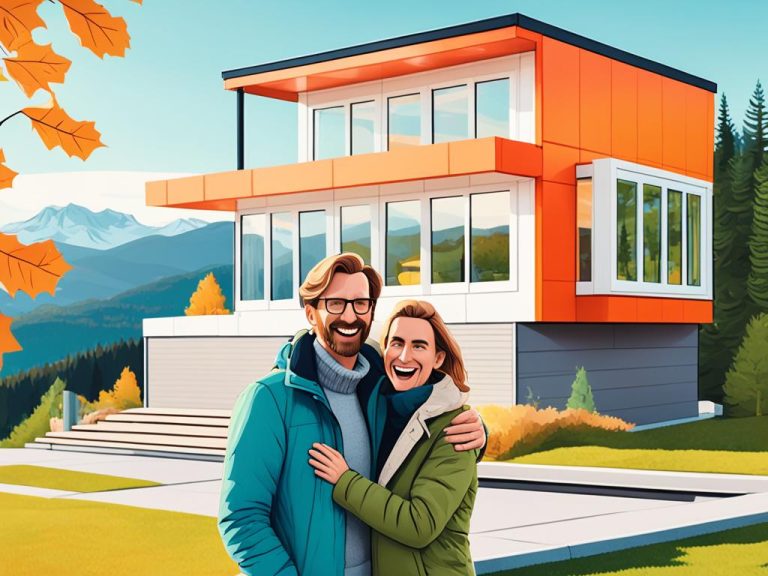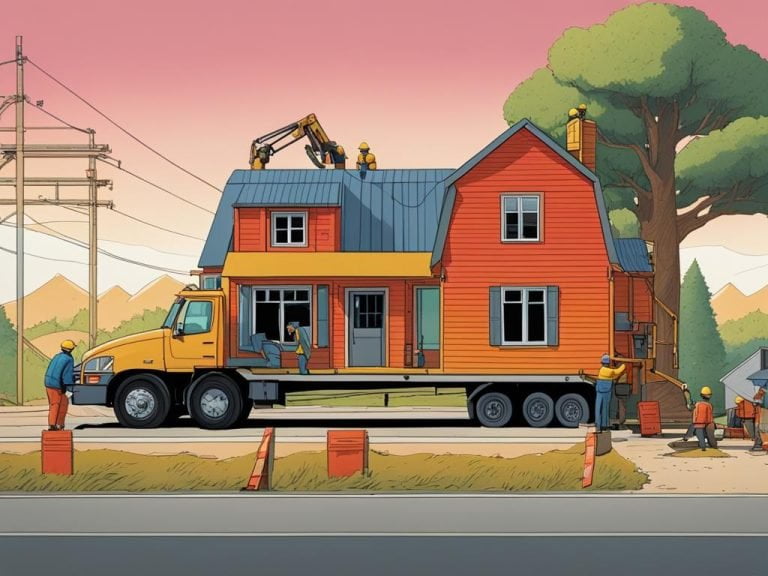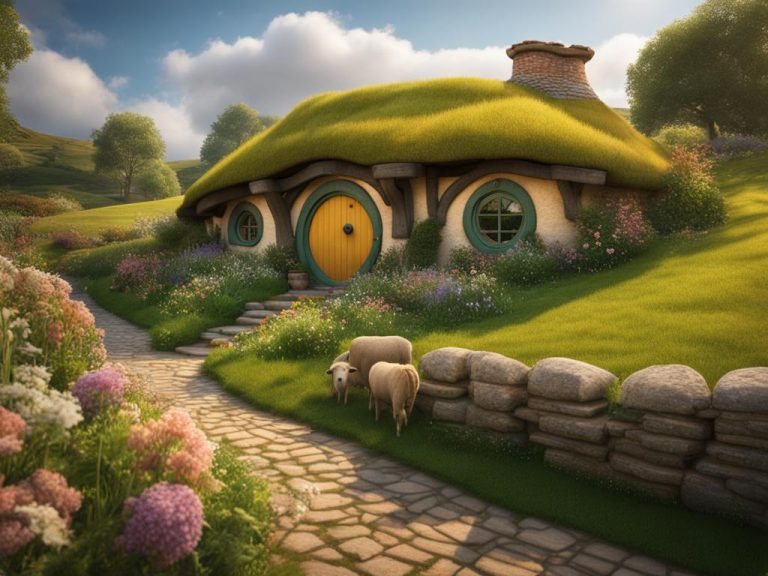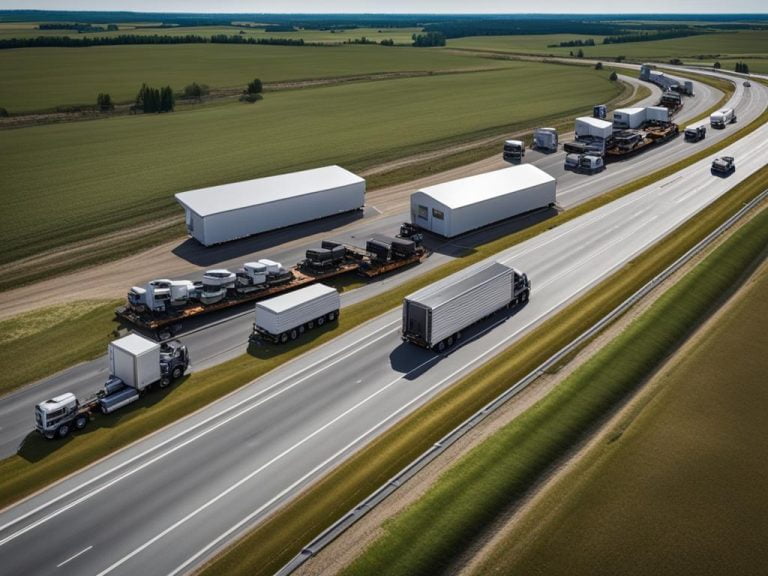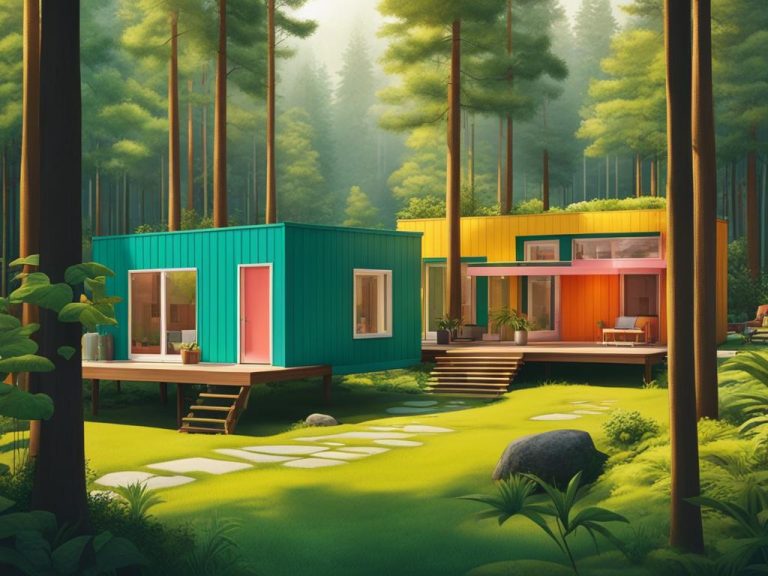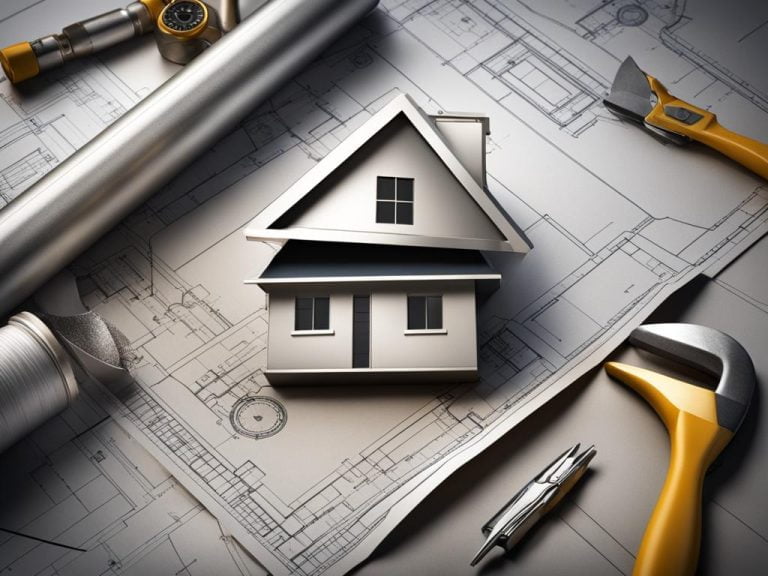Eco-Friendly Modular Homes in the UK
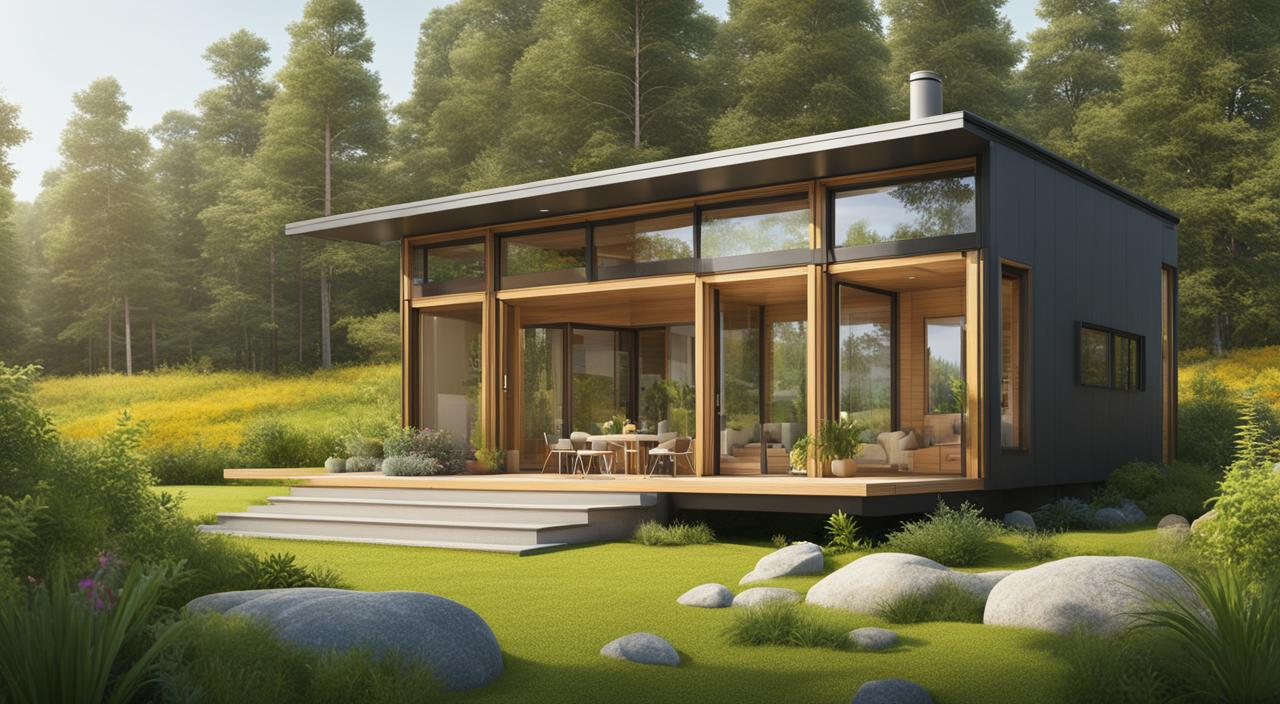
Amidst growing environmental concerns and a burgeoning housing crisis, the UK is turning a new leaf in residential architecture with the rise of ecological modular homes. These eco-friendly prefabricated houses are breaking ground as a beacon of sustainable living solutions. Masterfully combining the principles of green modular homes with an ethos of environmentally friendly construction, these innovative dwellings are sculpting the future of green building design. By drawing on cutting-edge technology and conscientious material choices, these modular homes are setting the bar for living spaces that are as kind to the Earth as they are to their inhabitants.
With expedited construction times, a smaller carbon footprint, and an unyielding commitment to quality, these homes offer a pragmatic and attractive road to homeownership. Beyond their environmental merits, they provide practical solutions to modern living, featuring adaptive designs that coalesce efficiency with personalised aesthetics. Home seekers across the country are now presented with an opportunity to own a home that supports the planet’s well-being while offering the comfort and elegance of contemporary design.
Key Takeaways
- Eco-conscious housing is shaping the UK’s property market landscape.
- Modular homes prioritise both sustainability and personalisation.
- Rapid assembly and construction processes reduce traditional building times.
- A focus on natural light and air quality ensures a healthier living environment.
- Energy-efficient materials like sheep’s wool enhance insulation and comfort.
Understanding Ecological Modular Homes in the UK
As we delve into the world of ecological modular homes, it’s clear that the United Kingdom is paving the way for sustainable housing. These innovative structures are more than just a place to live; they embody a commitment to eco-conscious housing principles that resonate with a growing population eager for sustainable living solutions. Let’s explore what sets these remarkable homes apart and why they are becoming a cornerstone of the green building movement.
Defining Eco-Conscious Housing Concepts
Eco-conscious housing is a progressive approach that intertwines environmental responsibility with modern living. Ecological modular homes champion this cause by offering energy-efficient features, such as advanced insulation from natural materials like sheep’s wool and wood fibre. These materials are not only superior in retaining heat but also support a healthier living environment. When it comes to exteriors, choices such as timber, zinc, or stone cladding not only enhance the home’s aesthetics but also ensure it remains in harmony with nature’s palette. Through these endeavours, these homes reduce the ecological footprint, offering residents peace of mind and a greener future.
Awareness and Demand for Sustainable Living Solutions
The last decade has seen a significant surge in awareness and demand for sustainable housing. Across the UK, from Scotland’s wind-swept lochs to the buzzing streets of London, individuals and collectives are embracing modular homes as a means to align their lifestyles with sustainable practices. The appeal extends through a spectrum of buyers, from eco-friendly families to forward-thinking local authorities looking for viable housing solutions. This shift highlights a cultural turning point where the value of sustainability is becoming entrenched in the fabric of British housing.
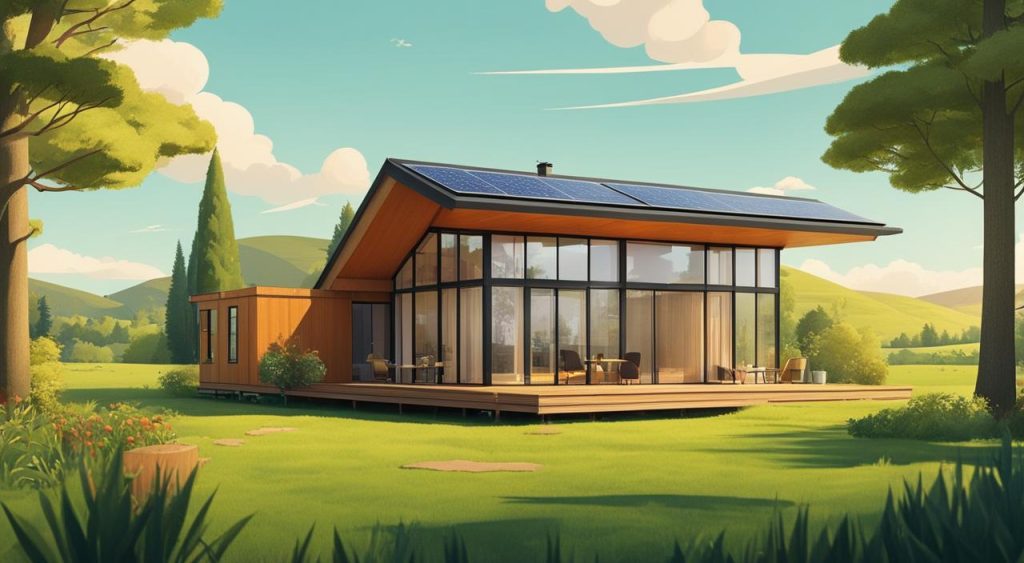
Such properties are not a mere trend but a decisive step towards long-term environmental stewardship. Whether for individual self-builders asserting their ecological ethos or community groups fostering sustainable communities, modular homes are a testament to a nation’s dedication to green living. The UK continues to showcase its role as a pioneer in the practical realisation of eco-conscious housing, stemming from thoughtful design and a collective desire to nurture our planet.
- Engineered timber panels for structural integrity and thermal efficiency
- Use of renewable, natural insulation materials for eco-friendly living
- Diverse cladding options to suit aesthetic and environmental needs
- Broad appeal, from private homeowners to public sector developments
The Advantages of Sustainable Prefabricated Houses
The eco-conscious movement within the UK’s housing sector has found a strong ally in the growing popularity of sustainable prefabricated houses. As these innovative structures proliferate, their impact on both living standards and the environment is becoming increasingly acknowledged. Advantages span beyond the mere reduction of carbon footprint, aligning with the national pursuit of energy-efficient and customisable living solutions. Let’s delve into the diverse benefits that these houses provide to their residents and the broader community.
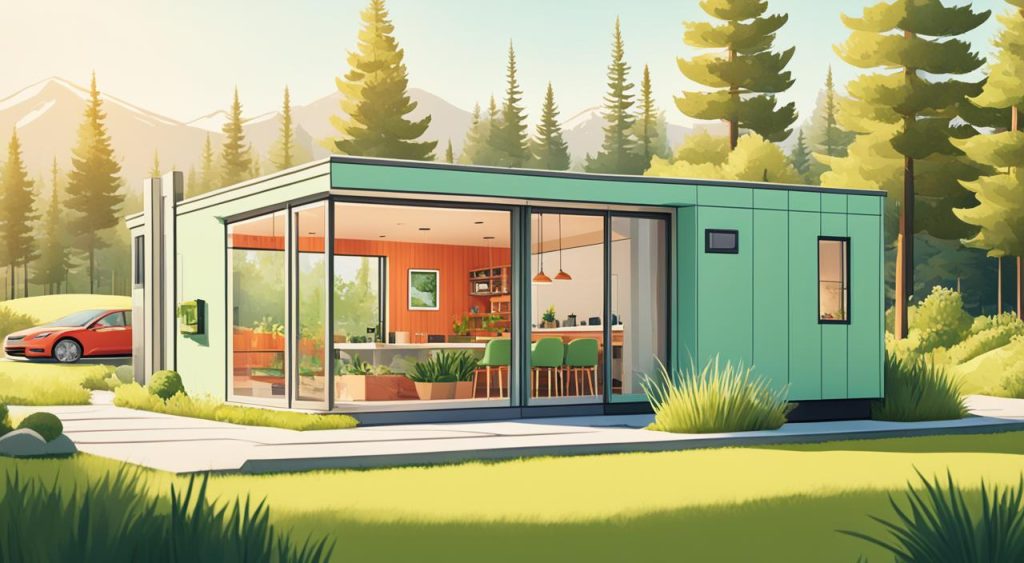
A compelling feature of these homes is their intrinsic flexibility. Unlike conventional housing, the prefabricated sections are designed and built off-site in a controlled environment, ensuring quality and reducing waste. Meanwhile, the array of natural cladding materials—from locally-sourced timber to innovative composites—allows for a home that is not only eco-friendly but aesthetically appealing as well.
- Use of sustainable construction methods that minimise environmental disruption during building.
- Modular components can be easily transported and assembled, leading to a faster construction timeline.
- Reduction in on-site construction waste through precision engineering and planning.
Not only do these houses embody the principles of sustainable living, but they are also at the forefront of energy-efficiency. With options such as solar PV panels and built-in roof lights, they are designed to harvest clean energy and provide abundant natural light, consequently reducing reliance on non-renewable energy sources.
- Integration of renewable energy systems for self-sufficient power supply.
- High-performance insulation and glazing to minimise heat loss.
- Smart design that supports optimal energy consumption and reduces overall running costs.
The involvement of prospective homeowners in the customisation process marks a shift towards a more personal and empowering approach to housing. The capacity to tailor finishes, fittings, and features to individual tastes ensures each home is as unique as its owner while maintaining ecological standards and energy efficiency. Indeed, energy-efficient modular homes and sustainable prefabricated houses are not just homes, but harbingers of a future where every household is an active participant in the quest for sustainability.
Construction and Design of Energy-Efficient Modular Homes
The conception of energy-efficient modular homes represents a striking advancement in environmentally friendly construction. Our focus within the UK industry is to weave sustainable construction methods into every aspect of design, ensuring that future habitats not only contribute to the well-being of their inhabitants but also foster a healthy planet.
Innovative Use of Engineered Timber Panels
Central to this endeavour is the pioneering utilisation of prefabricated engineered timber panels. These elements are both structurally sound and sympathetic to the environment, proving that durability and sustainability can go hand in hand. The innovation doesn’t end with their impressive load-bearing capacities; it is their airtight yet breathable nature that makes them truly exceptional, creating living spaces that retain heat effectively while preventing moisture build-up.
Employing Sheep’s Wool and Wood Fibre for Insulation
Complementing the timber panels are insulating materials that hallmark traditional craftsmanship and natural bounty: sheep’s wool and wood fibre. When combined, they form an insulation barrier superior to conventional options, significantly reducing the need for artificial heating and cooling. This eco-friendly approach transcends energy efficiency, delving into the realm of ecological responsibility.
- Sheep’s wool offers a natural solution with incredible thermal properties, whilst supporting rural economies.
- Wood fibre, sourced sustainably, accentuates the home’s green credentials and endows it with greater acoustic insulation.
In conclusion, the integration of these materials not only satisfies a commitment to building energy-efficient modular homes but illustrates a broader dedication to environmentally friendly construction practices throughout the UK.
Customisation Options for Green Modular Homes
The growing sector of green modular homes in the UK introduces an array of customisation possibilities, enabling individuals to shape their eco-friendly prefabricated houses into unique sanctuaries. With sustainability and personal style at the core, these homes are becoming the epitome of modern living, aligned with environmental consciousness.
Investigating the customisation in sustainable housing, one uncovers the various aspects that can be tailored to meet the exacting demands of eco-aware homeowners:
- Exterior Cladding Materials: Homeowners can select from an array of natural cladding options, ensuring their home harmonises with both the environment and their personal aesthetic.
- Interior Design Finishes: The interior finish plays a crucial role in creating a healthy and inviting atmosphere, with options that reflect the owner’s taste whilst maintaining ecological integrity.
- Roofing Features: Roofing can be adapted to include solar panels or skylights, enhancing energy efficiency and allowing natural light to infiltrate the living space.
Customisation in sustainable housing goes beyond the superficial, with each design choice contributing to the home’s ecological footprint. By prioritising features that promote energy efficiency and reduce carbon emissions, owners are not just creating a home, but stewarding the environment for future generations.
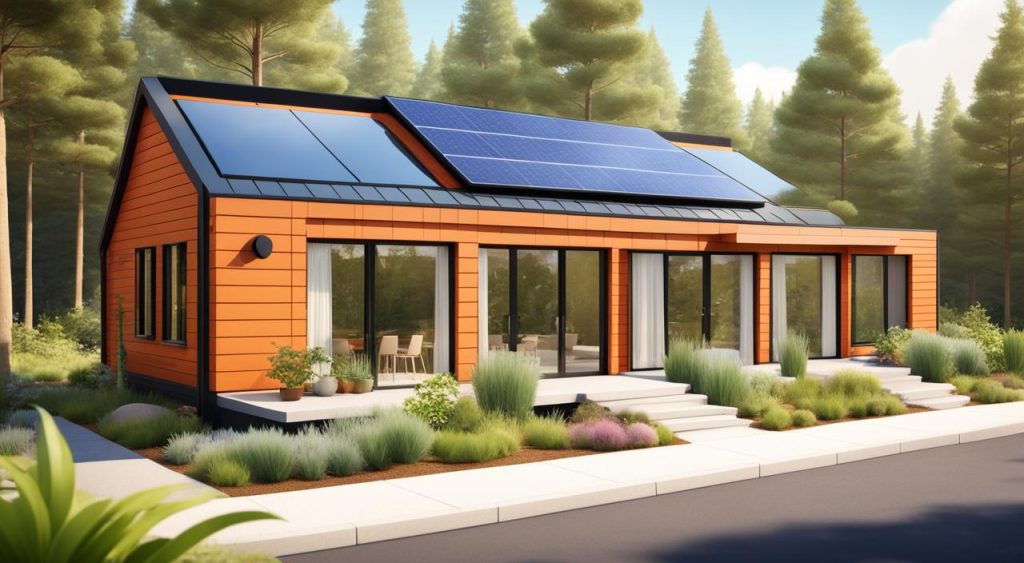
Ultimately, the journey towards owning a green modular home is one paved with decisions that mirror one’s commitment to an eco-responsible lifestyle. From ethical sourcing of materials to the integration of renewable energy sources, the power to customise lies in the homeowner’s hands, leading to a residence that is both a personal haven and an exemplar of eco-friendly living.
Eco-Friendly Features in Modern Modular Homes
Embracing the new wave of housing, modern modular homes in the UK are at the vanguard of innovation, merging eco-friendly features with cutting-edge design. These abodes are not just shelters but serve as paradigms of environmental responsibility, tailored to improve the quality of life for their inhabitants while safeguarding our planet.
Maximising natural light has become a cornerstone in modern architecture, not only for its aesthetic value but for its profound impact on energy conservation and wellbeing. Large windows and strategically placed skylights are common sights in these homes, illuminating interiors with sunlight that reduces the need for artificial lighting and provides vital Vitamin D.
Maximising Natural Light and Ensuring Healthy Air Quality
The philosophy behind modern modular homes extends into the realm of health, prioritising air quality to cultivate a non-toxic and breathable environment. Special attention is given to ventilation systems and the selection of materials that release minimal or no volatile organic compounds (VOCs), creating indoor spaces free from contaminants that could harm respiratory health.
Integrating Sustainable Energy Sources like Solar PV Panels
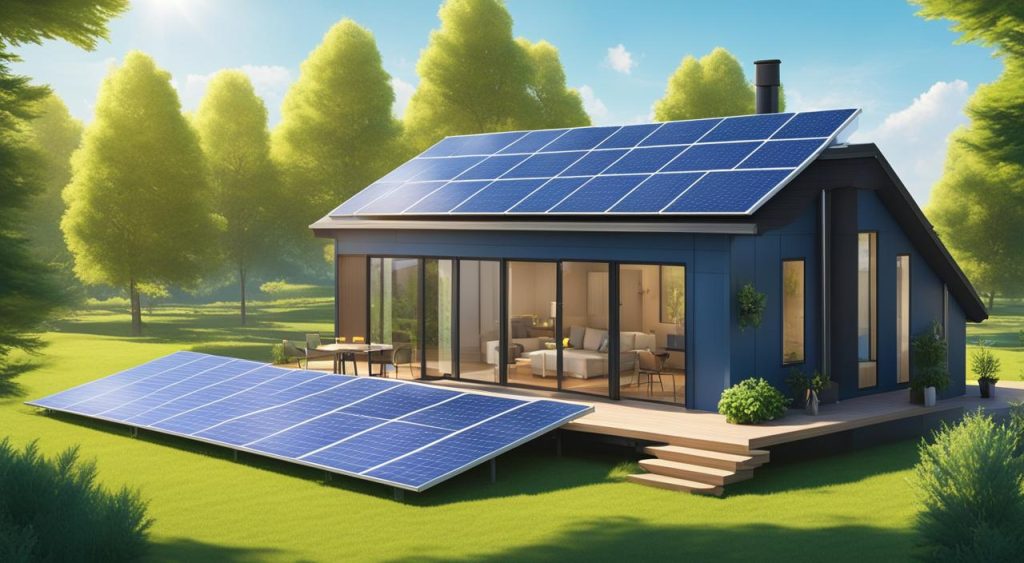
Transitioning towards sustainable energy sources, these residences often come with options for solar photovoltaic (PV) panels, encapsulating the essence of self-reliance and eco-conscious living. By generating their own clean energy, homeowners are able to significantly cut down on their carbon footprint whilst contributing to the broader sustainability goals.
Together, these features forge a habitat that not only stands the test of time but also leads the charge in the shift towards a more sustainable future. When you opt for a modern modular home, you’re not just investing in a place to live, but in a lifestyle that champions eco-friendly choices and a brighter tomorrow.
Ecological Modular Homes: Construction Process and Timeframe
The rise of ecological modular homes in the United Kingdom marks a significant shift toward more responsible construction practices. Distinct for their clever blend of green building design and sustainable construction methods, these homes are noteworthy for their streamlining of the traditional build process.
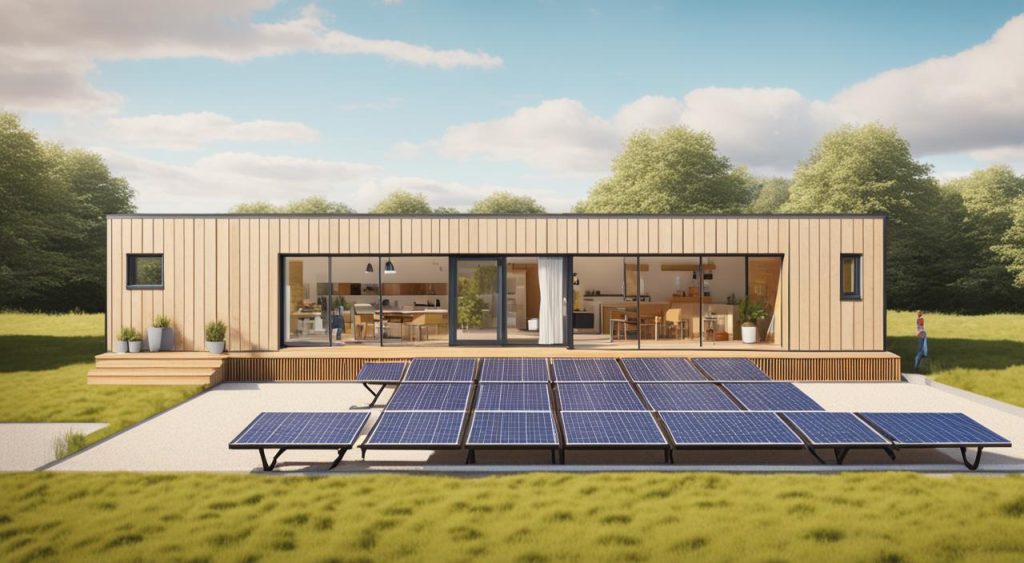
The construction journey of such eco-conscious dwellings unfurls in two primary phases. Initially, the homes emerge within the confines of a factory setting. Here, the controlled environment ensures that each component aligns with precision, eschewing the unpredictability of outdoor conditions.
- Factory Phase (Approximately 8 weeks): In a controlled, weather-independent environment, the construction of modules and the integration of essential features occur.
- On-site Phase (Subsequent 8 weeks): Meticulous assembly, the fusion to utilities, and the final touches come to fruition on the designated land space.
The streamlined approach lends itself to a remarkably condensed timeframe with an approximate total duration of 16 weeks, effectively slicing through the more drawn-out periods frequently associated with traditional building. Moreover, ecological homes benefit from a reduced environmental footprint, achieved by minimizing on-site disturbances during construction.
Collaboration and Communities: Eco-Friendly Construction for All
The ethos of sustainable housing development is deeply rooted in collaboration and inclusivity. Eco-friendly construction in the UK has seen a significant thrust forward with the collective efforts of various societal stakeholders. As we delve into the synergistic relationships that propel this green revolution, it’s clear that the combined forces of community land trusts, housing associations, and local authorities are foundational to achieving widespread eco-conscious habitation.
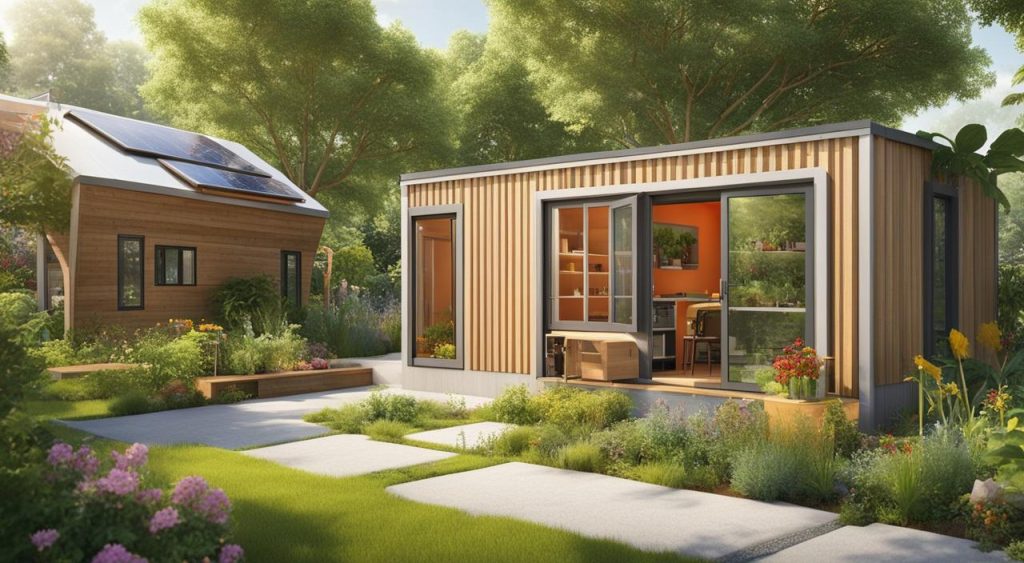
Community Land Trusts and Housing Associations
Within the fabric of British society, community land trusts (CLTs) stand out as beacons of hope for numerous individuals and families searching for affordable housing options that do not compromise on sustainability. These democratically-run organisations work tirelessly to ensure that land is utilised for the common good, often turning the tide in favour of eco-friendly construction. Paired with the unwavering support of housing associations, CLTs have made it possible to weave the green agenda into the very framework of housing solutions. The alliance of these trusts and associations has been pivotal in delivering homes that are not only cost-effective but also exemplary in their green credentials.
The Role of Local Authorities and Developers in Green Building
Amidst this collective journey towards a greener tomorrow, local authorities emerge as pivotal players. In tandem with visionary developers, they hold the reins of change, steering development projects towards balanced ecosystems that favour sustainability. The mindful actions taken by these authorities to enshrine green building practices reflect a deep-seated recognition of ecological imperatives. Their role transcends mere regulatory functions to embody a proactive stance in galvanising sustainable housing development. Such concerted efforts shed light on the powerful impact of governmental support in making eco-friendly construction accessible to all.
- Championing the adoption of ecological modular homes
- Delivering affordable, eco-conscious housing options
- Encouraging diverse, inclusive communities
Case Study: Transformative Impact of ZED PODS’ Eco-Friendly Modular Homes
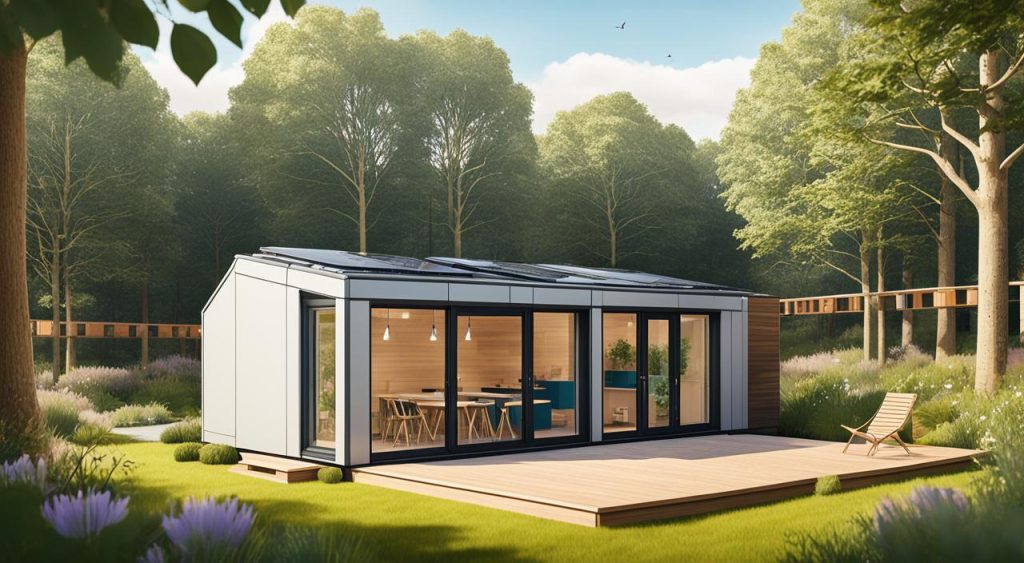
The ambitious projects undertaken by ZED PODS epitomise the transformative impact that innovative housing solutions can have within society. These unique and eco-friendly modular homes merge the ethos of sustainability with practical living to great acclaim across the UK. Providing zero-carbon housing solutions, ZED PODS challenge the traditional housing sector by offering a financially viable alternative that champions eco-consciousness.
One of the standouts is the Hope Rise initiative—a collaboration that has brought remarkable benefits to young at-risk adults by reducing living expenses through energy-efficient design. The success of this project is not solely measured in carbon metrics or energy savings, but also in its social contribution, leading to job creation and educational opportunities, fostering a sense of independence and community strength.
- Affordability: Breaking economic barriers in securing quality housing.
- Quality Living: Enhancing life through thoughtful, clean design and modern comforts.
- Sustainability: Commitment to zero-carbon living, from manufacturing to daily life.
- Societal Benefit: Contributing to the community by addressing homelessness and assisting young adults.
The story of ZED PODS is more than constructing walls and roofs. It is about laying the foundation for a brighter, cleaner, and more inclusive future, where housing is viewed not just as a physical space, but as a nurturing environment that actively contributes to personal growth and environmental stewardship.
Green Building Design and the Future of Sustainable Housing
The pursuit of sustainable housing within the UK has galvanised innovative approaches in green building design. Thought leaders and pioneers in the field are progressing beyond conventional models, crafting homes that synchronise with the rhythms of nature while leading the charge towards eco-efficiency. The delineation of a future where our homes contribute to a healthier planet is not just a vision—it’s a rapidly materialising reality. Architects and developers are interweaving features such as green roofs and earth sheltered designs to create not just buildings, but self-sustaining ecosystems.
Incorporating Green Roofs and Earth Sheltered Designs
Green roofs are revolutionising the urban skyline, not only softening the aesthetic impact of new constructions but also serving as a tool for insulating buildings and enriching biodiversity. Equally, earth sheltered designs, nestled within the landscape, offer remarkable energy conservation, merging with their surroundings to reduce visual intrusion and preserve natural topography. These elements symbolise a synergy with the environment that does not compromise the comforts of modern living, illustrating the future of sustainable housing is one where form meets function to spectacular effect.
The Integration of Passive Solar Design and Natural Heating Elements
Embracing passive solar design principles, the UK’s eco-houses are setting a standard for minimal environmental impact. Through strategic orientation, window placement, and the utilisation of thermal mass, these homes effortlessly soak up the sun’s warmth in colder months, while deflecting heat during warmer periods. The integration of natural heating elements exemplifies an organic approach to thermal comfort, underpinning a vision for living spaces that are not only energy efficient but also harmonious with their environment. As we navigate towards the future, green building design beckons us to a world where sustainability is inherently built into every brick and beam.
FAQ
What defines ecological modular homes in the UK?
Ecological modular homes in the UK are characterised by their sustainable construction methods, use of environmentally friendly materials, and emphasis on energy efficiency. They offer eco-friendly prefabricated housing solutions that contribute to sustainable living and are designed with green building principles in mind.
Why are eco-conscious housing concepts becoming more popular?
Eco-conscious housing concepts are gaining popularity due to increasing awareness of environmental issues and a growing demand for sustainable living solutions. People are seeking homes that have a lower carbon footprint, reduce energy consumption, and support a healthier lifestyle.
What are the advantages of sustainable prefabricated houses?
Sustainable prefabricated houses offer numerous benefits, such as reduced construction waste, faster build times, improved energy efficiency, and the ability to incorporate advanced sustainable construction methods. They are often more cost-effective and environmentally friendly compared to traditional construction.
How do engineered timber panels enhance the sustainability of modular homes?
Engineered timber panels provide a strong, durable and sustainable framework for modular homes. They are designed to be airtight, reducing heat loss, while also being breathable to regulate indoor air quality. This innovative use of timber is key to the environmentally friendly construction of energy-efficient modular homes.
Why is sheep’s wool and wood fibre insulation used in ecological modular homes?
Sheep’s wool and wood fibre are natural and renewable insulation materials that offer excellent thermal properties. By using these materials, ecological modular homes can achieve high levels of insulation, energy efficiency, and comfort, while reducing the environmental impact of the construction process.
Can I customise my green modular home?
Yes, green modular homes in the UK offer a wide range of customisation options. Homeowners can choose from different natural cladding materials, interior finishes, and sustainable features such as solar panels or skylights to personalise their eco-friendly prefabricated house according to their preferences and sustainable housing priorities.
What eco-friendly features are included in modern modular homes?
Modern modular homes come with features designed to maximise natural light and ensure healthy indoor air quality. These may include large windows, skylights, and the use of non-toxic building materials. Many also integrate sustainable energy sources like solar PV panels to reduce reliance on non-renewable energy and lower energy bills.
How long does it take to construct an ecological modular home?
The construction process of an ecological modular home in the UK is typically divided into a factory phase and an on-site phase. Factory construction takes about 8 weeks, and site assembly a further 8 weeks, making the total process approximately 16 weeks. This is much faster than traditional construction methods and reduces the environmental impact on the build site.
What is the role of community groups and local authorities in eco-friendly construction?
Community groups such as Community Land Trusts and housing associations, as well as local authorities, are pivotal in promoting and facilitating eco-friendly construction. They work together to develop affordable and sustainable housing options, creating inclusive communities that cater to a diverse range of residents.
How do innovations like ZED PODS contribute towards sustainable housing?
ZED PODS are a prime example of innovative, eco-friendly modular homes that provide zero-carbon housing solutions. These modular homes are affordable and are designed to make a transformative impact on communities, offering sustainable living options that tackle both environmental and social housing challenges.
How is the future of sustainable housing shaping up in terms of green building design?
The future of sustainable housing is incorporating more green building designs such as green roofs and earth-sheltered homes. These designs contribute to insulation, biodiversity, and energy efficiency. Passive solar design principles and natural heating elements are increasingly being used in eco-houses to further enhance their sustainability and reduce environmental impact.

